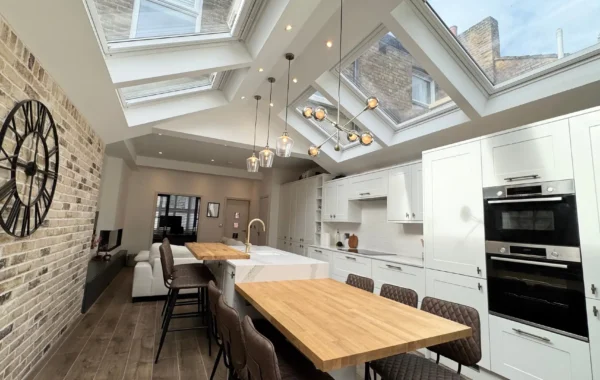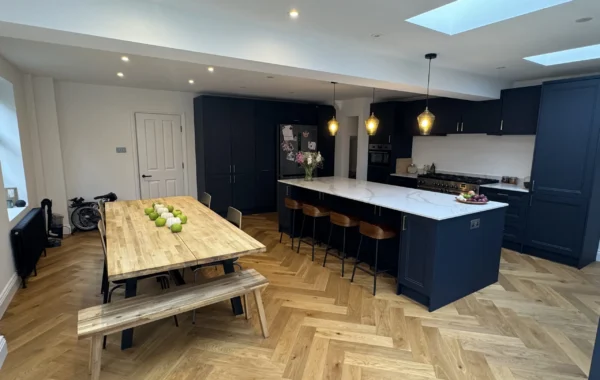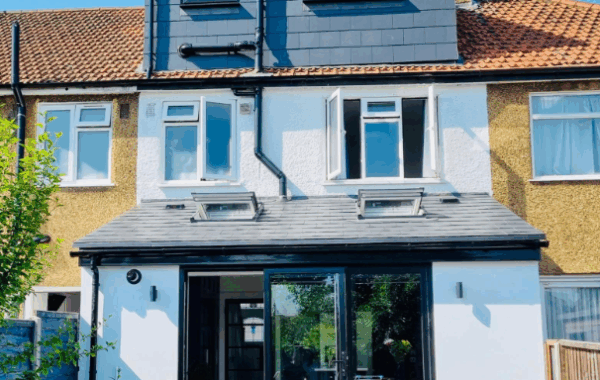
10 Modern House Extension Ideas for UK Homes
House Extension or Moving: Which Option Fits Your Needs and Budget Better?
When the walls of your home seem to be closing in due to a growing family or the need for extra space, you’re faced with a significant decision: should you opt for a house extension or pack up and move to a larger home? Both options come with their advantages, challenges, and financial implications. This blog explores both choices, helping you decide which is the better fit for your lifestyle, budget, and long-term goals.
Understanding House Extension
A house extension involves adding extra space to your current property. Whether it’s a new room, an extended kitchen, or even a second floor, an extension increases both the functionality and value of your home.
Benefits of House Extension
- Retain Your Location: You love your neighborhood and the convenience it offers—why leave it?
- Cost-Effective: While extensions involve costs, they’re often less expensive than moving.
- Tailored Design: Customize your space to meet your specific needs.
- Increased Property Value: Extensions often boost your home’s market value, making them a long-term investment.
Costs of a House Extension
While a house extension may seem like the ideal solution, it’s essential to consider the costs. On average, extensions can range between $25,000 and $150,000 depending on the size, materials, and location. Additional costs such as permits, architectural designs, and labor fees also factor into the equation.
Factors Influencing Costs
- Type of Extension: A single-story extension is less costly than a multi-story one.
- Material Choices: Premium materials increase costs but add value.
- Local Regulations: Permits and approvals can vary by region, affecting timelines and expenses.
Advantages of Moving
When an extension isn’t practical, moving to a larger home might be the better option. This allows you to find a property that already suits your needs.
Reasons to Consider Moving
- Instant Space: A new home may offer all the features you need without construction delays.
- New Opportunities: Moving can open doors to better schools, amenities, or job opportunities.
- Modern Features: Many newer homes come equipped with energy-efficient designs and contemporary layouts.
The Hidden Costs of Moving
While moving might seem like the straightforward choice, it’s not without hidden costs:
Reasons to Consider Moving
- Realtor Fees: Selling your current home and buying a new one involves commissions.
- Stamp Duty and Taxes: Depending on your location, these fees can significantly impact your budget.
- Moving Costs: Hiring movers, transportation, and packing materials all add up.
- Renovations in the New Home: Your new house may still require updates to make it feel like home.
Comparing House Extension and Moving
Financial Implications
- House Extension:
Extensions often cost less than moving, especially when considering realtor fees, stamp duty, and moving costs. Additionally, a well-planned extension can increase your home’s resale value. - Moving:
While the upfront costs are higher, moving may provide an opportunity to invest in a property with long-term potential.
Emotional Considerations
- Staying Put: A house extension allows you to stay in the place you love, surrounded by familiar neighbors and routines.
- Starting Fresh: Moving provides a chance for a fresh start, though it may come with emotional challenges such as leaving behind memories or adjusting to a new environment.
Questions
Key Questions to Ask Before Deciding
Can you afford the costs associated with a house extension or the fees tied to moving?
Will an extension provide enough room, or do you need a larger property?
Through a unique combination of engineering, construction and design disciplines and expertise, Concor delivers world class infrastructure solutions to customers and stakeholders across a broad range of industry sectors.
If your current neighborhood plays a vital role in your lifestyle, a house extension could be the better choice.
Final Thoughts: Making the Right Decision
Deciding between a house extension and moving depends on your unique circumstances, budget, and future plans. A house extension is ideal for those who want to stay in their current location, enjoy customization, and save on the costs associated with moving. On the other hand, moving may be the better choice if you’re looking for instant space, new opportunities, or an entirely fresh start.
Ultimately, there’s no one-size-fits-all answer. Evaluate your needs, consult professionals, and choose the option that aligns with your vision for the future.
FAQ
-
- How long does a house extension take?
A house extension typically takes 3 to 6 months, depending on the complexity of the project. - Does an extension always add value to your home?
Most extensions increase a property’s value, but this depends on quality, design, and market trends. - Are there financing options for house extensions?
Yes, home improvement loans and mortgage refinancing are common ways to fund a house extension. - Is it possible to live in the house during the extension?
In most cases, you can remain in your home during construction, though some disruptions should be expected. - What permissions are needed for a house extension?
Planning permissions and building regulations approval are usually required. Consult your local authority for specific requirements.
- How long does a house extension take?




